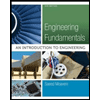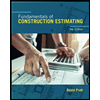
EBK ENGINEERING FUNDAMENTALS: AN INTROD
5th Edition
ISBN: 9780100543409
Author: MOAVENI
Publisher: YUZU
expand_more
expand_more
format_list_bulleted
Concept explainers
Question
Chapter 7, Problem 1P
To determine
Estimate the dimensions of the given objects. Compare the estimated value with actual dimension of the object.
Check the valuing capacity of dimension from the comparison.
Expert Solution & Answer
Explanation of Solution
Use the following procedure to estimate and compare with actual dimension of the object:
- Value the dimensions of the given object without using any measuring device. This is called estimated values.
- List the estimated values in Table 1.
- Measure the actual dimension of the object by using the measuring instruments.
- List the actual values of the objects in Table 1.
- Compare the estimated value with measured value.
- Calculate the difference between the estimated and actual value.
Provide the estimated value, actual dimensions, and the difference between each object as shown in table 1.
| Object | Estimated values | Measured values | Difference | |||
| This book | ||||||
| A pen or pencil | ||||||
| A laptop computer (closed) | ||||||
| A 12-fl.-oz soda can | ||||||
| The distance from home to school | ||||||
| A dollar bill | ||||||
| The height of your engineering building | ||||||
| Wingspan of a Boeing 747 | ||||||
Table 1
Refer to Table 1:
The difference between the estimated and calculated value is minimum. The accuracy of estimated value is moderate.
Want to see more full solutions like this?
Subscribe now to access step-by-step solutions to millions of textbook problems written by subject matter experts!
Students have asked these similar questions
PLease make sure to show all work and all steps
for the image find the magnitude and stresses
Showing all work and steps find the
magnituded and stress ,
What is the value of the influence line for the reaction at support A for the beam shown at 5 m to the right of A? Select the reaction at support B to be the redundant.
a. 0 kN
b. -0.167 kN
c. 0.425 kN
d. 1.0 kN
Chapter 7 Solutions
EBK ENGINEERING FUNDAMENTALS: AN INTROD
Ch. 7.2 - Prob. 1BYGCh. 7.2 - Prob. 2BYGCh. 7.2 - Prob. 3BYGCh. 7.2 - Prob. 4BYGCh. 7.2 - Prob. 5BYGCh. 7.2 - What does strain represent?Ch. 7.2 - Prob. BYGVCh. 7.5 - Prob. 1BYGCh. 7.5 - Describe two different methods that you can use to...Ch. 7.5 - Prob. 3BYG
Ch. 7.5 - Prob. 4BYGCh. 7.5 - Prob. 5BYGCh. 7.5 - Prob. BYGVCh. 7 - Prob. 1PCh. 7 - Prob. 2PCh. 7 - Prob. 3PCh. 7 - Prob. 4PCh. 7 - Prob. 5PCh. 7 - Prob. 6PCh. 7 - Prob. 7PCh. 7 - Prob. 8PCh. 7 - Prob. 9PCh. 7 - Prob. 10PCh. 7 - Investigate the diameter of the electrical wire...Ch. 7 - Prob. 12PCh. 7 - Prob. 13PCh. 7 - Prob. 15PCh. 7 - Prob. 17PCh. 7 - Using area as your variable, suggest ways to cool...Ch. 7 - Prob. 19PCh. 7 - Prob. 20PCh. 7 - Prob. 21PCh. 7 - Prob. 22PCh. 7 - Prob. 23PCh. 7 - Prob. 24PCh. 7 - Prob. 25PCh. 7 - Prob. 26PCh. 7 - Prob. 27PCh. 7 - Prob. 28PCh. 7 - Prob. 30PCh. 7 - Prob. 31PCh. 7 - Prob. 32PCh. 7 - Prob. 33PCh. 7 - Prob. 34PCh. 7 - Prob. 35PCh. 7 - Prob. 36PCh. 7 - Prob. 37PCh. 7 - Prob. 38PCh. 7 - Prob. 39PCh. 7 - Prob. 40PCh. 7 - Prob. 41PCh. 7 - Prob. 42PCh. 7 - A 10 cm long rectangular bar (when subjected to a...Ch. 7 - Prob. 44PCh. 7 - Prob. 45PCh. 7 - Prob. 46PCh. 7 - Prob. 47PCh. 7 - Prob. 48PCh. 7 - Prob. 49PCh. 7 - Prob. 50P
Knowledge Booster
Learn more about
Need a deep-dive on the concept behind this application? Look no further. Learn more about this topic, civil-engineering and related others by exploring similar questions and additional content below.Similar questions
- Determine the force in member AB of the truss shown due to a temperature drop of 25°C in Members AB, BC, and CD and a temperature increase of 60°C in member EF. Use the method of consistent deformations. a. 37.34 k b. 0 k c. 28 k d. 46.67 karrow_forwardWhat is the approximate axial force in girder EF of the frame shown? Use the portal method. a. 32 kN b. 60 kN c. 12 kN d. 20kNarrow_forwardDetermine the vertical reaction at C for the beam shown and support settlements of 1" at B and ¼" at C. a. 27.0 k b. 28.3 k c. 43.7 k d. 21.0 karrow_forward
- What is the horizontal reaction component at D for the frame shown? a. 75.00 kN b. 91.67 kN c. 70.31 kN d. 4.69 kNarrow_forwardFind the vertical reaction at D for the frame shown and a settlement of 50 mm at support D. a. 80.7 kN b. 112.5 kN c. 144.3 kN d. 6.51 kNarrow_forwardDetermine if the W14x 22 beam will safely support a loading of w= 1.5 kip/ft. Theallowable bending stress is oallow = 22 ksi and the allowable shear stress is Tallow = 12 ksi.arrow_forward
- What is the fixed end moment FEMAB for the beam shown with a settlement of 1.2 in. at support B? a. -102.7 ft-k b. -95.2 ft-k c. -307.7 ft-k d. 279.8 ft-karrow_forwardSuggest an optimum footing size and shape (minimum area footing), if the vertical loading (includingthe weight of the footing) is 40 kips, and the soil has the following characteristics: c=200 psf, φ=370,and γ=120.0 lb/ft 3. Constraints of the solution are: the maximum dimension of any side of thefooting is 10 ft, and the depth of embedment is between 2 and 4 ft.arrow_forward15.6 A mountain stream flows over a rocky streambed. Apply the Limerinos and Chezy equations to calculate the discharge. The stream has an intermediate rock size d 84 of 30 cm, an average depth of 2.1 m, a slope of S = 0.0037, and a width of 52 m. In SI units, what is the discharge? a. 85, b. 120, c. 160, d. 240, or e. 410.arrow_forward
- The maximum bending moment for the beam shown is positive. a. True b. Falsearrow_forwardI have complete structural and architectural plans for a 3-storey residential house, and I need help computing the quantity of materials per floor for concrete, masonry (CHB walls), and reinforcing steel bars. Below are the extracted values from the plans. Can you please guide me step-by-step per floor on how to compute the following: Concrete volume for footings, columns, beams, slabs, and stairs CHB wall quantity in pieces (after deducting openings) and mortar volume Rebar estimates per structural elementarrow_forwardI have structural and architectural plans for a 3-storey residential house, and I need to compute the quantity of materials for concrete, masonry (CHB walls), and reinforcing steel bars. Based on the following extracted values from the plans, can you help me compute the estimated material quantities? ps. i just want to make sure my answer were correct.arrow_forward
arrow_back_ios
SEE MORE QUESTIONS
arrow_forward_ios
Recommended textbooks for you
 Engineering Fundamentals: An Introduction to Engi...Civil EngineeringISBN:9781305084766Author:Saeed MoaveniPublisher:Cengage Learning
Engineering Fundamentals: An Introduction to Engi...Civil EngineeringISBN:9781305084766Author:Saeed MoaveniPublisher:Cengage Learning Fundamentals Of Construction EstimatingCivil EngineeringISBN:9781337399395Author:Pratt, David J.Publisher:Cengage,
Fundamentals Of Construction EstimatingCivil EngineeringISBN:9781337399395Author:Pratt, David J.Publisher:Cengage,

Engineering Fundamentals: An Introduction to Engi...
Civil Engineering
ISBN:9781305084766
Author:Saeed Moaveni
Publisher:Cengage Learning

Fundamentals Of Construction Estimating
Civil Engineering
ISBN:9781337399395
Author:Pratt, David J.
Publisher:Cengage,